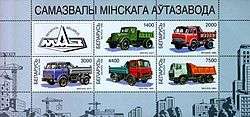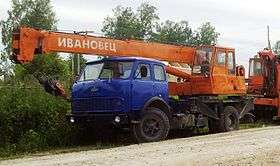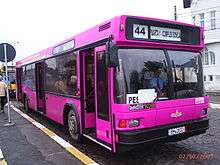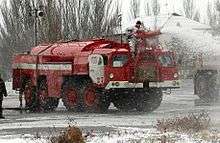Minsk Automobile Plant
|
MAZ logo | |
|
Central entrance to MAZ factory | |
Native name | Minski Autamabilny Zavod |
|---|---|
| Joint-stock company | |
| Industry | Automotive |
| Founded | July 16, 1944 |
| Headquarters | Minsk, Belarus |
Area served | Worldwide |
Key people | Aliaksandr Barouski |
| Products | Trucks, buses, trolleybuses |
|
| |
| Website |
www |
Minsk Automobile Plant (MAZ, Belarusian: Адкрытaе Акцыянэрнaе Таварыства «Мінскі аўтамабільны завод», Open JSC Minski Autamabilny Zavod, Russian: Минский автомобильный завод Minskyi Avtomobilnyi Zavod) is a state-run automotive manufacturer association in Belarus, one of the largest in Eastern Europe.
History

It was built shortly after the Second World War. The first MAZ model (MAZ-200) used General Motors designed 2-stroke engines. Later on their own original engines were developed and implemented in the MAZ-500 series. Not only the plant itself, but the entire living infrastructure were built in a short time. Apartment buildings, shops, medical clinics, cinemas etc. were built in close proximity to the MAZ plant, providing plant workers with local (though limited) necessities. On many of the construction sites German prisoners of war were working together with Belarusian construction workers. The majority of these buildings are still in service today.
It manufactures heavy-duty trucks, buses, trolleybuses, road tractors and semi-trailers for semi-trailer trucks, and cranes. MAZ was, and possibly is, the world's largest manufacturer of TELs (Transporter-Erector-Launchers) for many of the world's mobile ballistic missiles, from the widely proliferated MAZ-543 used to carry and launch the Scud B through to the recent Topol M's impressive 8-axle TEL.
At the end of Soviet times, MAZ was the largest manufacturer of heavy trucks in the Soviet Union, and the only one for some truck categories. After the Soviet Union dissolved, MAZ production was reduced substantially, as has happened with many enterprises in the ultra-industrialized Belarus, oriented on the needs of a very big country. The previously mentioned production of public transport vehicles was a result of following diversification of the company.
Organisation
The association consists of the MAZ plant proper, located in Minsk, which is the main enterprise of the association, as well as several secondary enterprises:
- РУП «БААЗ» (in Baranavichy)
- РУП «ОЗАА» (in Asipovichy)
- РУА «КЗТШ» (in Zhodino)
- РУП «Літмаш» (in Minsk),
- ПРУП «ДЭМЗ» (in Dzyarzhynsk)
- РУП «СтройМАЗтрест» (in Minsk)
At some points of its history, MAZ was "united" with another heavy automobile company - BELAZ also located in Minsk area.
In 1991, a division specialising in heavy wheeled military vehicles was spun off into a separate business, MZKT.[1]
Products
Among other recent products, MAZ city buses (see pictures below) are operating throughout Belarus, as well as in Russia, Ukraine, Poland, Romania, Serbia and Estonia.[2]
In Serbia, working in cooperation with a local-based company BIK (Bus industries Kragujevac), a production of gas-powered buses named BIK-203 has been agreed, which are based on the platform of MAZ-203 model.[3][4] These buses have been delivered at several Serbian towns to be in use in public transportation companies.
MAZ-MAN
In 1997, together with "MAN", a joint Belarusian-German company JSC "MAZ-MAN", Minsk was set up, which by 1998 had established full-scale production of heavy vehicles, using the F90 MAN cabs introduced 1986 and replaced 1994. Production of truck cabs involves huge, expensive tools, making this kind of recycling an existing design attractive. While production of tractors for international trade with 4x2 and 6x4 chassis layouts was a stated goal, development of exhaust gas regulations within the EU turned this into illusion. Based on the MAZ-MAN they have produced concrete mixers, fueling vehicles, flatbed trucks, dump trucks, front-end loaders etc.
Production of the Belarusian-German company demonstrated the advantage of technology created by combining the abilities and experience of auto makers of two countries. Compared to European models in the same class and quality range, MAZ-MAN products are on average 30% cheaper. Currently 98% of MAZ-MAN comply with Euro-3, while sale to the EU would require Euro-5 at least, Euro-6 by 2014.
In 2004, the joint venture made 272 vehicles, which is 45% higher than 2003. At the same time in 2003, output in comparison with 2002 increased by 50%.
28 November 2005 MAZ-MAN sold 1000 of the first MAZ-MAN tractor to customers.
Models
Trucks
|
|
Buses
- MAZ-101 (1993)
- MAZ-103 Omnibus (1996)
- MAZ-103T Trolleybus (1999)
- MAZ-104 (1997)
- MAZ-105 (1997)
- MAZ-107 (2001)
- MAZ-152 city bus (1999)
- MAZ-163
- MAZ-171 Airport bus (2005)
- MAZ-203 Omnibus (2005)
- MAZ-205 (2009)
- MAZ-206 Omnibus (2006)
- MAZ-207
- MAZ-215
- MAZ-226 (2007)
- MAZ-231
- MAZ-241
- MAZ-251 (2006)
- MAZ-256 Omnibus (2006)
Special models
- MAZ-535/MAZ-537 - The MAZ-535 and the heavier version MAZ-537 were developed in the early 1960s and built to transport rockets and tanks of various types.
- MAZ-543 - The MAZ-543 was also designed for the transport of medium-and long-range missiles and has the same specifications as the MAZ-537. The MAZ-543 is best known as mobile missile launch pad of Scud missiles. In addition, there are various modifications of the vehicle, such as the MAZ-547 as a mobile launch pad for SS-20 missiles or the MAZ-7917 as a launch pad of Topol intercontinental missile.
- MAZ-7904 - The MAZ-7904 is the largest wheeled vehicle that was ever designed for military purposes in the USSR. The prototype was designed in 1982 as a support vehicle for intercontinental ballistic missiles, but never went into production. The vehicle was found in 2007 in a hangar at Baikonur.[5][6]
- MAZ-7907 - The MAZ-7907 is a 12-axled 24 wheel vehicle for transport of ICBMs, which was designed in 1985, and of which two prototypes were produced. At least one seems to have been used after the collapse of the USSR for transportation of bridge parts and ships. Their fate is unclear.
- MAZ-537
- MAZ-543
 MAZ-7917
MAZ-7917
Generations
| No | years of release | Features | Photo |
|---|---|---|---|
| 1 | 1950—1965 | | |
| 2 | 1965—1977 | .jpg) | |
| 3 | 1977—1990 |  | |
| 4 | since 1981 |  | |
| 5 | since 1997 | |
Sponsorship in football
- 1999–2002: Torpedo-MAZ Minsk
Gallery
Buses
 MAZ-105 bus.
MAZ-105 bus.


 MAZ 103 CNG
MAZ 103 CNG- MAZ-103T trolleybus in Minsk

- MAZ-203 and MAZ-206 bus
- MAZ-251 in Munich
Trucks
- MAZ-5551
 9K72 Elbrus launcher (9P117)
9K72 Elbrus launcher (9P117) MAZ-543 airport tender, airport in Kyrgyzstan
MAZ-543 airport tender, airport in Kyrgyzstan Fire truck ATs 5,0-50-4 on MAZ-5337A2 -01
Fire truck ATs 5,0-50-4 on MAZ-5337A2 -01 MAZ-5337 Firetruck in Baranavichy, Belarus
MAZ-5337 Firetruck in Baranavichy, Belarus
Notes
- ↑ "Minsk Wheeled Tractor Plant (MZKT)". 2011-05-15. Retrieved 2011-05-15.
- ↑ http://news.belta.by/en/news/econom?id=185402
- ↑ Gas-powered bus from Kragujevac at ekapija.rs, 20-4-2009
- ↑ MAZ-BIK 203 at Vulović Transport official website
- ↑ "Soviet Army Super Vehicles - Ballistic Missile Carriers & other super trucks". 2013-06-10. Retrieved 2013-06-10.
- ↑ "Автомодельное бюро: МАЗ-7904". 2013-06-10. Retrieved 2013-06-10.
References
- Peter J. Davies: Trucks of the World - The encyclopedia of makes and models from 2002. Motor Book, Stuttgart. ISBN 3-613-02257-5 .
External links
| Wikimedia Commons has media related to MAZ vehicles. |
Coordinates: 53°51′44″N 27°39′15″E / 53.86222°N 27.65417°E
